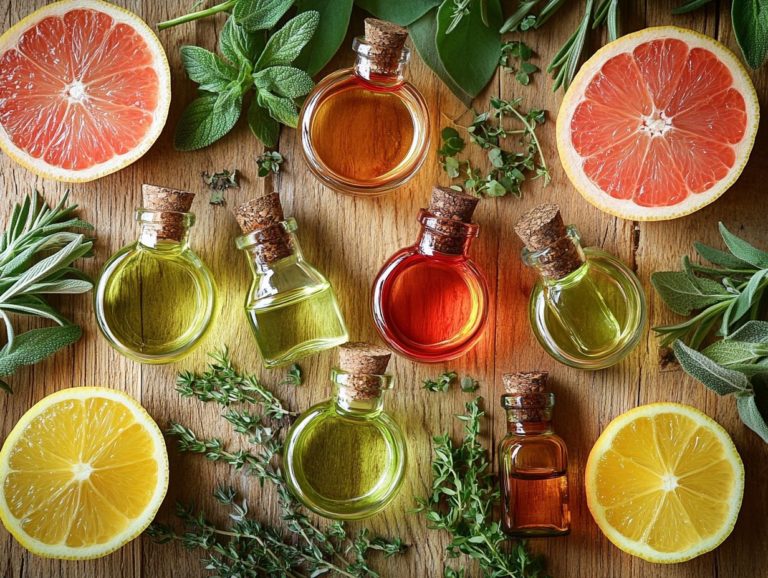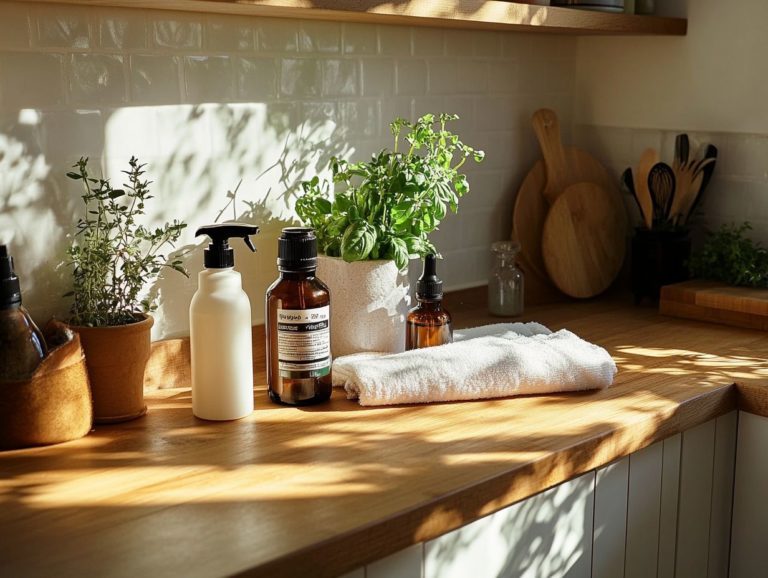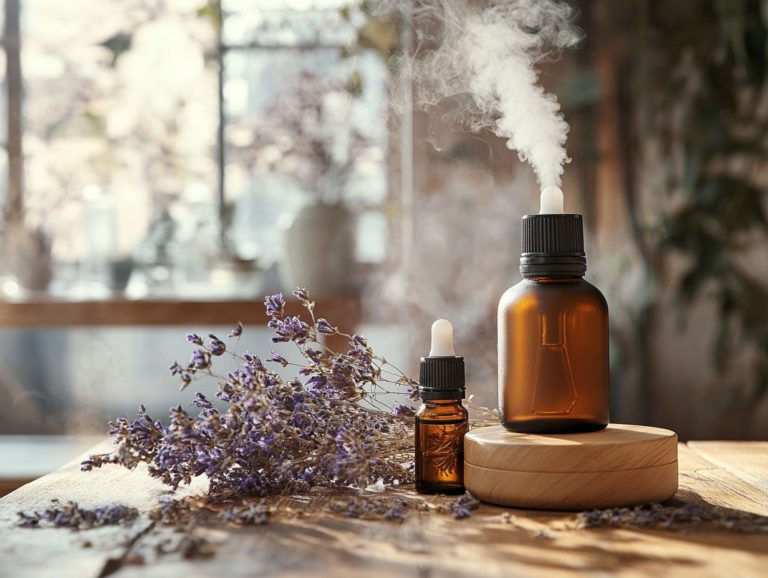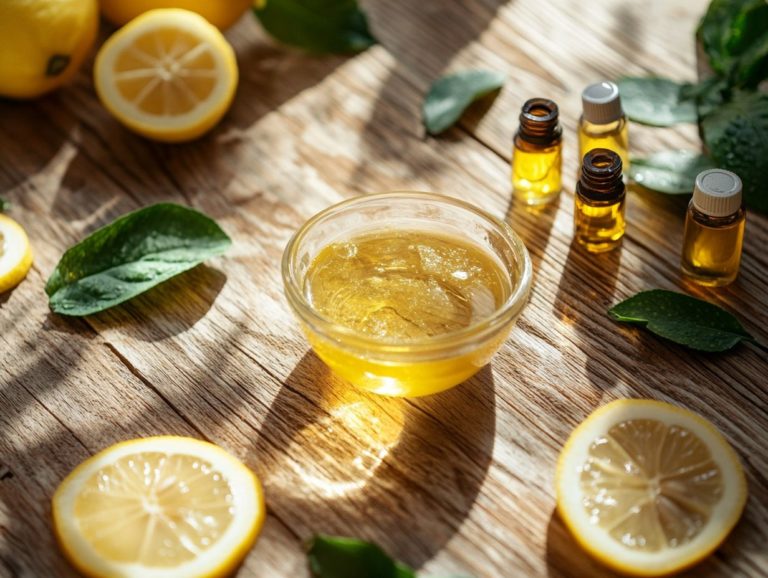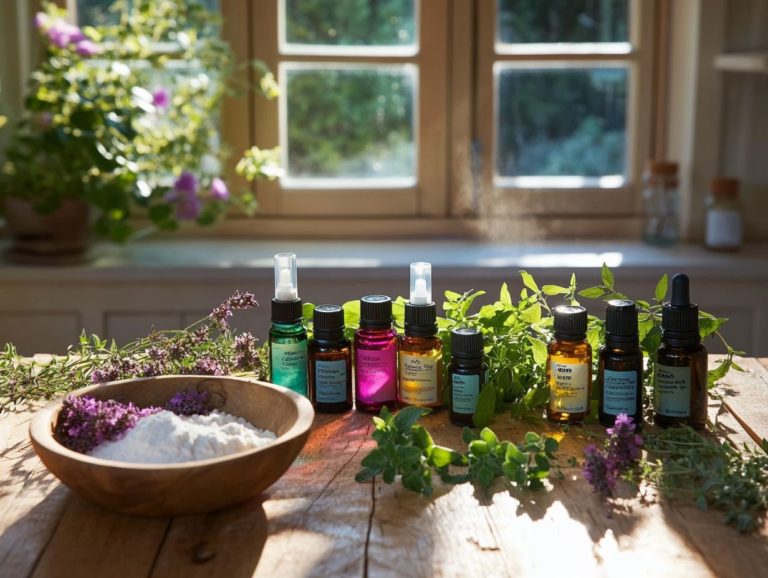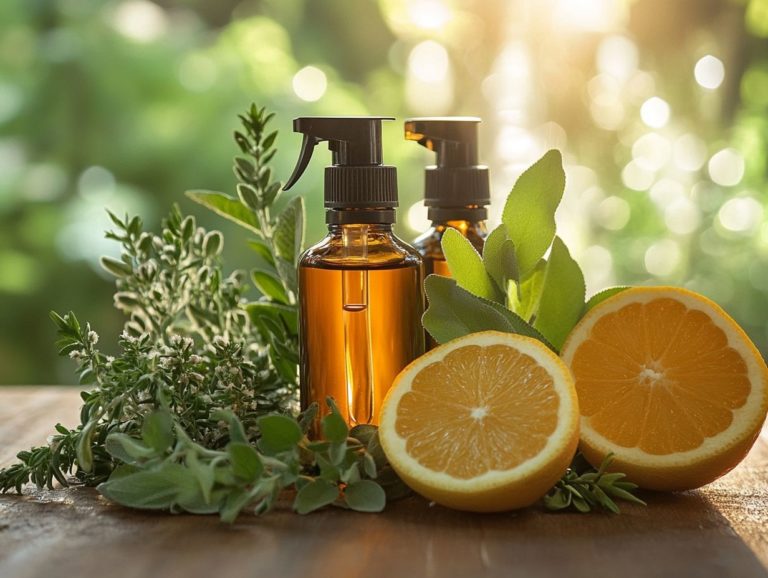Essential Oils for Cleaning: A Holistic Approach
People love essential oils for their amazing scents and their incredible cleaning power! In this article, you’ll uncover the essence and benefits of essential oils, learn how they can revolutionize your cleaning routine, and discover the advantages they offer over traditional chemical-laden products.
From effective DIY recipes to essential safety precautions, you’ll explore a holistic approach to keeping your home pristine while prioritizing the health of your family and pets. Embrace the power of nature in your cleaning arsenal and elevate your home care experience!
Contents
- Key Takeaways:
- What Are Essential Oils?
- How Can Essential Oils Be Used for Cleaning?
- How to Use Essential Oils for Cleaning?
- What Precautions Should Be Taken When Using Essential Oils for Cleaning?
- What Are Some Alternative Cleaning Methods Using Essential Oils?
- Are There Any Side Effects of Using Essential Oils for Cleaning?
- Frequently Asked Questions
- What are essential oils and how can they be used for cleaning?
- Which essential oils are best for cleaning?
- How can I use essential oils for cleaning?
- Are essential oils safe to use for cleaning?
- Can essential oils replace traditional cleaning products?
- Are there any specific precautions I should take when using essential oils for cleaning?
Key Takeaways:
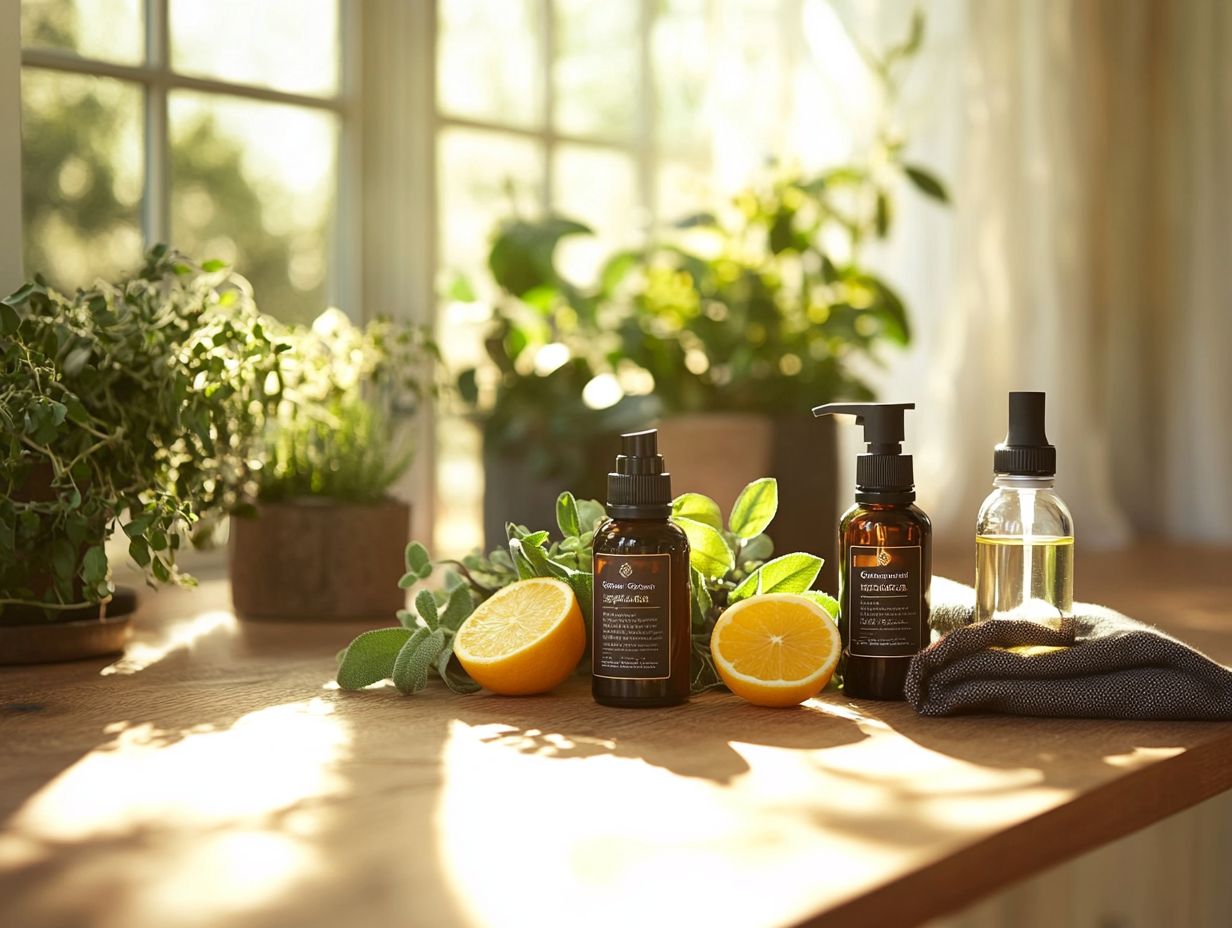
- Essential oils have natural cleaning properties that make them a great alternative to harsh chemical cleaners.
- Some essential oils, like Lemon essential oil and Tea Tree oil, have antibacterial and antiviral properties that make them effective for disinfecting surfaces.
- When using essential oils for cleaning, it is important to dilute them properly and follow safety precautions, such as keeping them out of reach of children and pets.
What Are Essential Oils?
Essential oils are concentrated extracts obtained from a variety of plants, showcasing an impressive array of natural scents that not only create enchanting fragrances but also deliver a multitude of health benefits.
Oils such as Lavender, Lemon, Eucalyptus essential oil, and Tea Tree oil are frequently incorporated into natural cleaning products, offering powerful disinfectant properties while fostering a non-toxic environment. A non-toxic environment means keeping your home free from harmful chemicals that can affect health.
You ll find these pure essential oils at health food stores or through trusted essential oil brands, and they are becoming increasingly favored in DIY cleaning. Embracing these oils promotes eco-friendly solutions for your household cleaning routines, allowing you to create a space that is both clean and health-conscious.
How Can Essential Oils Be Used for Cleaning?
You can use essential oils as a remarkable alternative for cleaning by swapping out chemical-laden products for more natural, non-toxic options. Not only do these oils effectively clean, but they also fill your home with a refreshing scent.
By utilizing essential oil blends like doTERRA On Guard or combinations of Lemon, Eucalyptus essential oil, and Tea Tree oils, you can craft eco-friendly cleaning solutions that tackle a variety of household chores all while being conscious of the health concerns tied to conventional cleaning products and ensuring a non-toxic environment.
What Are the Benefits of Using Essential Oils for Home Cleaning?
The benefits of using essential oils for cleaning are truly remarkable, offering a wealth of advantages from their natural antibacterial properties to their ability to make your home smell good. Oils such as Lemon, Eucalyptus, and Tea Tree act as powerful natural disinfectants, providing effective alternatives to traditional cleaning products while embracing a green cleaning approach that is both eco-friendly and safe for your pets.
By using eco-friendly multi-purpose cleaner solutions, you can significantly enhance the cleanliness and aroma of your home. Not only do these oils help you eliminate harmful chemicals, but they also enhance your indoor air quality.
Take Lavender, for example; it’s well-known for its calming effects and can be seamlessly integrated into your cleaning routine to promote a sense of relaxation. On the other hand, Peppermint essential oil brings a refreshing scent and doubles as a natural pest repellent, making it especially useful in kitchens and dining areas.
By incorporating these diverse oils into your cleaning regimen, you can enjoy an aromatic and safe environment, free from synthetic fragrances and their potential health risks. The antimicrobial properties in many essential oils for cleaning effectively combat germs and bacteria on surfaces, paving the way for a healthier home.
What Are the Most Common Essential Oils Used for Cleaning?
Among the most essential oils you can use for cleaning are Lemon essential oil, celebrated for its powerful degreasing abilities. Eucalyptus essential oil is renowned for its remarkable antibacterial properties. Tea Tree oil is prized for its natural disinfectant prowess.
You may also find Peppermint appealing for its invigorating scent. Lavender is perfect for cultivating a calming atmosphere. An array of herbal oils like Cinnamon and Clove not only provide aromatic benefits but also enhance the effectiveness of your natural cleaning solutions.
Oils from the citrus family, such as Wild Orange and Douglas Fir, can also offer a fresh scent while boosting cleaning power.
Regarding surface cleaning, Lemon essential oil truly shines as a natural degreaser, effortlessly cutting through sticky residues on countertops and stovetops. Eucalyptus essential oil is your go-to for sanitizing high-touch areas like doorknobs and light switches, all while uplifting the ambiance with its fresh aroma.
For laundry, Tea Tree oil not only disinfects but also combats mildew, ensuring your clothes emerge smelling fresh. Peppermint invigorates the washing process, imparting a refreshing scent to your linens.
Lavender is perfect for creating a tranquil environment, making it ideal for your bedroom linens. Let s not forget the warm, spicy notes of Cinnamon and Clove, which can be infused into your cleaning solutions to boost efficacy while enveloping your space in an inviting fragrance.
How to Use Essential Oils for Cleaning?
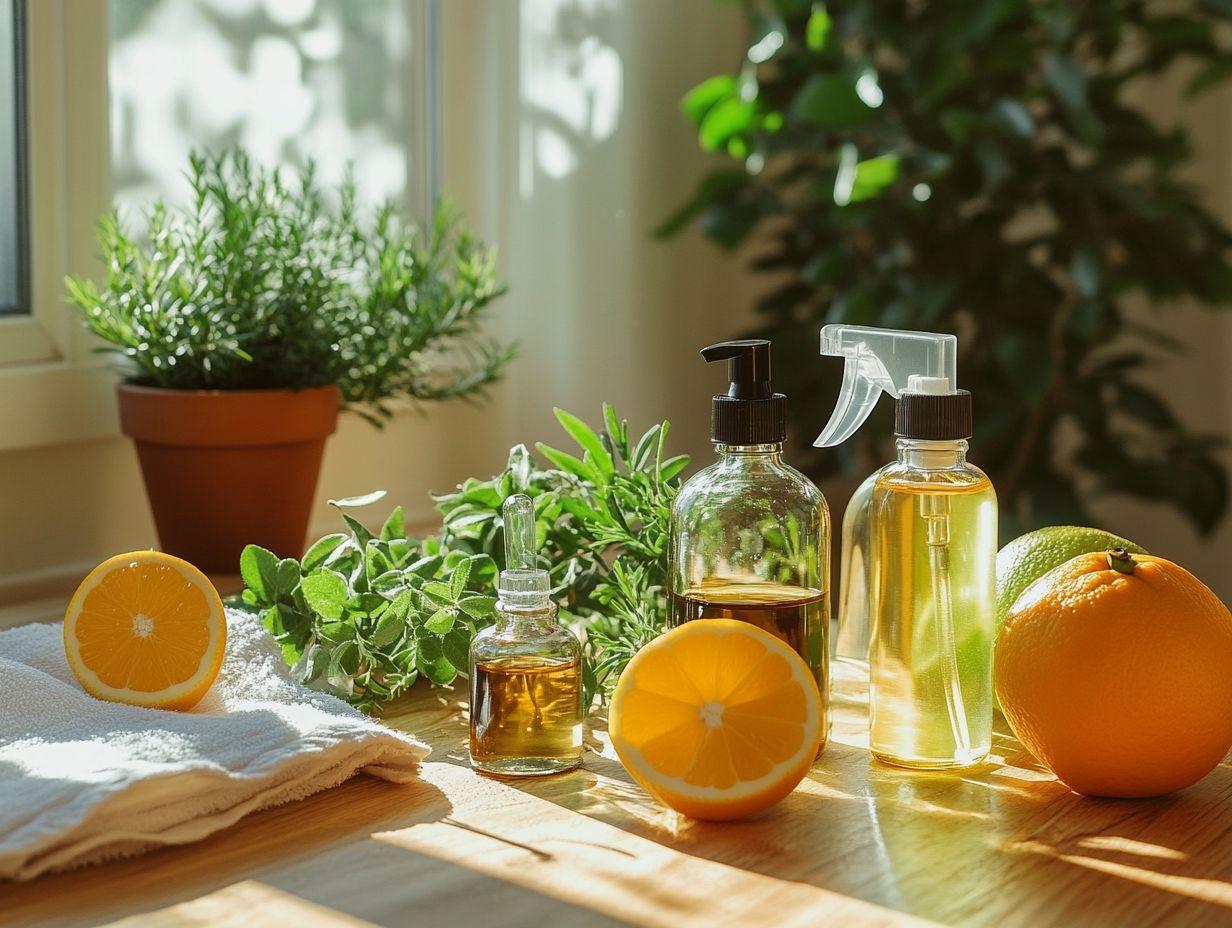
Transform your cleaning routine with essential oils! Utilizing these oils for cleaning turns mundane tasks into delightful experiences, enabling you to create your own bespoke DIY cleaning products that reflect your unique preferences.
Whether you are creating an all-purpose cleaner, a cleaning spray, or a cleaner concentrate, these natural products offer a greener alternative.
By integrating oils like Lemon and Eucalyptus into your cleaning regimen, you can concoct a remarkably effective all-purpose cleaner or a revitalizing cleaning spray.
When paired with common household ingredients like vinegar and baking soda, you ensure a meticulous clean that prioritizes both safety and health. Indulge in the refreshing aromas that these oils offer! Incorporating organic essential oils can further enhance the purity and effectiveness of your cleaning solutions.
What Are Some DIY Cleaning Recipes Using Essential Oils?
Creating your own DIY cleaning recipes with essential oils is an exceptional way to keep your home clean and fresh without relying on harmful chemicals.
For example, whip up a simple all-purpose cleaner by combining vinegar with essential oil blends like Lemon and Tea Tree. Try crafting a refreshing cleaning spray using Peppermint and water, offering an aromatic boost that elevates your cleaning routine.
Utilizing natural ingredients helps ensure your cleaning products are not only effective but also safe for your household.
By utilizing natural ingredients, these recipes foster a healthier living environment and help minimize the plastic waste associated with commercial products.
One straightforward recipe involves mixing 1 cup of water with 10 drops of Lavender essential oil to create a soothing room spray that banishes odors while delivering a calming fragrance.
Another effective option is a scrubbing paste made from 1 cup of baking soda, 1/4 cup of soap made from vegetable oils, and 15 drops of Eucalyptus oil, perfectly designed to tackle tough grime in bathrooms and kitchens.
Each of these homemade solutions highlights the effectiveness and eco-friendliness of incorporating essential oils into your everyday cleaning routine.
What Precautions Should Be Taken When Using Essential Oils for Cleaning?
Take specific precautions to ensure safety when incorporating essential oils into your cleaning routine, especially regarding health concerns like allergies and sensitivities.
Opt for high-quality, pet-safe essential oils sourced from reputable brands. Before applying them widely, conduct a patch test to sidestep any adverse reactions and maintain a clean and safe environment for everyone.
Are Essential Oils Safe for Pets and Children?
Ensuring the safety of your pets and children when using essential oils for cleaning is absolutely paramount. Certain oils can be toxic to animals or irritate sensitive skin. It s crucial to choose pet-safe options, such as Lavender and Lemon. You’ll want to steer clear of any oils known to be harmful and always keep cleaning products stored out of reach of both kids and pets. Pet-safe essential oils should be a key consideration in your cleaning routine.
Besides Lavender and Lemon, you might find that oils like Chamomile and Frankincense are generally considered safe. However, be cautious with oils such as Tea Tree, Peppermint, and Eucalyptus essential oil if you have furry friends around, as they can be toxic.
When incorporating essential oils into your cleaning routine, it’s wise to dilute them properly and apply them when children and pets are not present. This gives the aroma a chance to dissipate before they return to the area. Using pet-safe essential oils like Lavender and Chamomile can help ensure the safety of your furry friends while maintaining a clean environment.
Regularly ventilating the spaces where you use oils can significantly reduce any lingering potency. This makes the environment more comfortable and safer for everyone in your household. Choose reputable brands that provide detailed safety information to help ensure a secure atmosphere for all family members.
What Are Some Alternative Cleaning Methods Using Essential Oils?
Alternative cleaning methods that harness the power of essential oils present you with an eco-friendly and effective way to maintain a pristine home. These methods emphasize natural disinfectants and cleaning solutions that minimize your exposure to harsh chemicals. Embracing DIY (Do It Yourself) cleaning solutions can cut down on plastic waste and promote a healthier living environment.
By integrating essential oil blends into your cleaning routine, you can craft strong but gentle cleaners that efficiently tackle grime and bacteria while fostering a healthier living environment using essential oils: nature’s best cleaning agents.
Can Essential Oils Be Used in Natural Disinfectants?
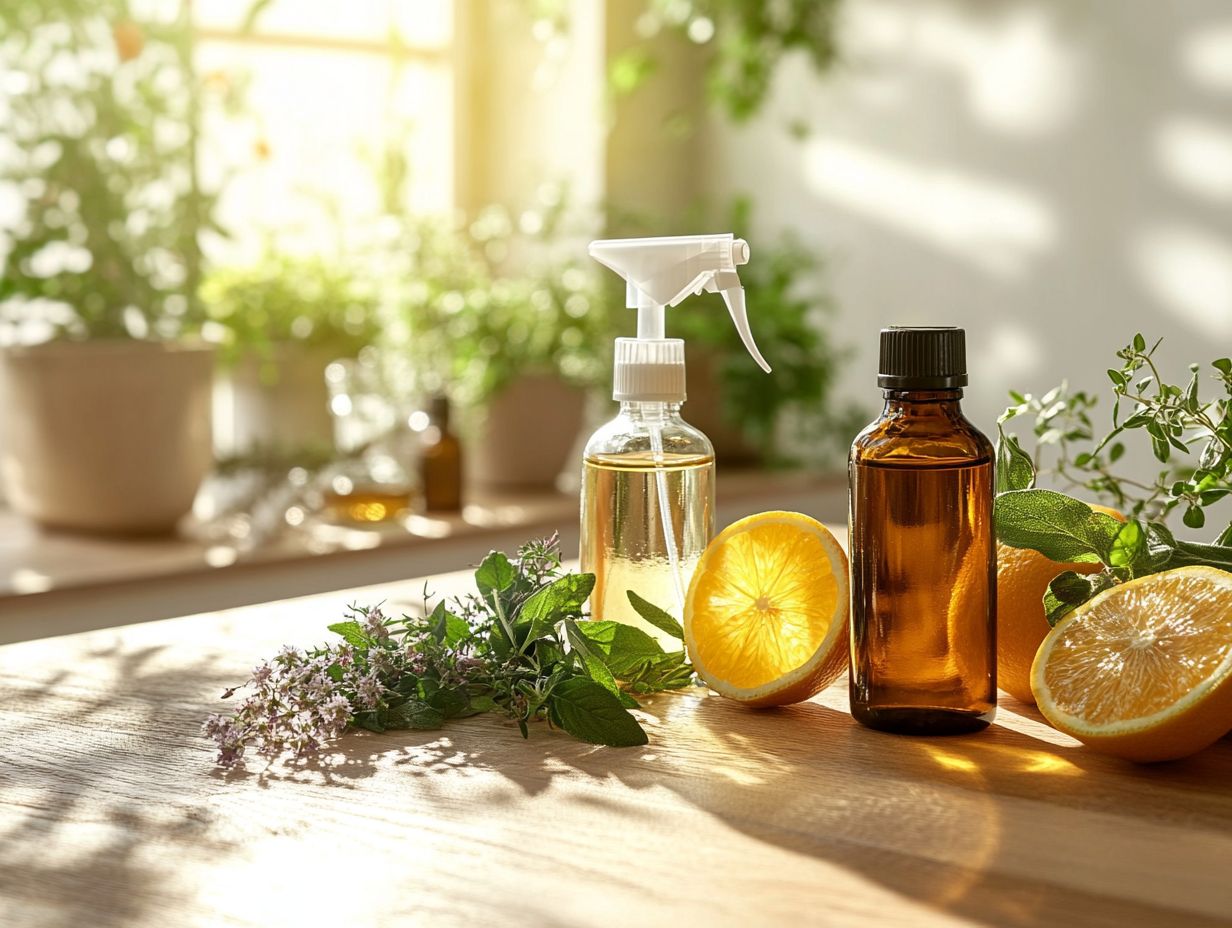
Yes, essential oils serve as highly effective natural disinfectants, thanks to their inherent antibacterial properties. They make a remarkable addition to your homemade cleaning solutions. Oils like Tea Tree and Eucalyptus stand out for their ability to enhance the potency of natural disinfectants, allowing you to craft DIY recipes that eliminate harmful bacteria from surfaces throughout your home.
Incorporating these oils not only elevates your cleaning efficacy but also infuses your space with a refreshing aroma that synthetic chemicals simply can’t match. For example, you can whip up a simple DIY disinfectant spray by mixing one cup of water with half a cup of white vinegar, then adding ten drops of Tea Tree oil and five drops of Lavender oil. This creates a soothing yet powerful cleaner that will leave your home feeling fresh, as highlighted in the role of essential oils in holistic cleaning.
Similarly, when you combine Lemon oil with Peppermint, you achieve a citrusy and invigorating blend that not only disinfects but also lifts your spirits while you clean. By utilizing essential oils for a greener cleaning routine in these innovative ways, you contribute to a healthier living environment and promote sustainable practices in your household cleaning routine.
How Can Essential Oils Be Used to Cleanse the Air?
Essential oils are a wonderful way to freshen the air in your home, neutralizing unwanted odors while infusing your space with delightful aromas. When you utilize essential oil blends like Lavender, Peppermint, or Citrus oils in diffusers or sprays, you create an invigorating scent that refreshes your environment and enhances your overall wellness.
Incorporating these oils into your daily cleaning routine can amplify their air-purifying benefits. For instance, when you add a few drops of Tea Tree oil to your cleaning solutions, you not only eliminate germs but also introduce a refreshing fragrance.
Place a bowl of water with a few drops of your favorite essential oil near heat sources to spread pleasant scents throughout the room.
Engaging with these methods fosters an atmosphere that feels clean and vibrant. This uplifts your spirit and soothes your mind. Transform your space into a sanctuary that promotes relaxation and well-being!
Are There Any Side Effects of Using Essential Oils for Cleaning?
Essential oils are typically considered safe for cleaning when used correctly, but it’s important to be aware of potential side effects, especially regarding allergic reactions and sensitivities.
Practicing essential oil safety is crucial. Choose the right blends and follow the recommended usage guidelines to minimize any health concerns tied to their use. By doing so, you can enjoy the benefits of essential oils while keeping your well-being in check.
Can Essential Oils Cause Allergic Reactions?
Yes, essential oils can indeed trigger allergic reactions in some individuals, particularly those with sensitive skin or current allergies. It’s essential to test a small area of skin and consult with a healthcare provider when using essential oils for cleaning. This precaution helps avoid adverse reactions and ensures safe usage.
Many essential oils contain common allergens like linalool and limonene, which can trigger reactions in sensitive individuals. When you begin to incorporate essential oils into your cleaning routines, it s wise to start with just one oil and gradually introduce others. Pay close attention to any adverse effects, such as itching, redness, or swelling on your skin.
Keeping a record of any reactions can aid in identifying specific allergens and determining safer alternatives. Opting for high-quality oils and diluting them appropriately can further minimize risks, allowing you to enjoy the delightful benefits of scented cleaning without compromising your health.
Can Essential Oils Be Harmful If Ingested?
Essential oils can indeed pose risks if ingested, given their highly concentrated nature, which may lead to irritation or toxicity if not managed appropriately. It is essential to adhere strictly to essential oil safety guidelines, refraining from ingestion unless explicitly indicated and overseen by a qualified professional.
Ingesting these potent extracts can result in unpleasant reactions such as nausea, stomach discomfort, or even severe allergic responses, particularly for individuals with current health problems. Understanding the correct applications of essential oils is vital; they are typically safe for use in aromatherapy, topical applications, and household cleaning solutions when adequately diluted.
For example, when used in diffusers or as part of massage blends, essential oils can provide aromatic benefits without the associated ingestion risks. Always consult product labels and consider seeking the expertise of a certified aromatherapist to ensure safe practices are followed.
Frequently Asked Questions
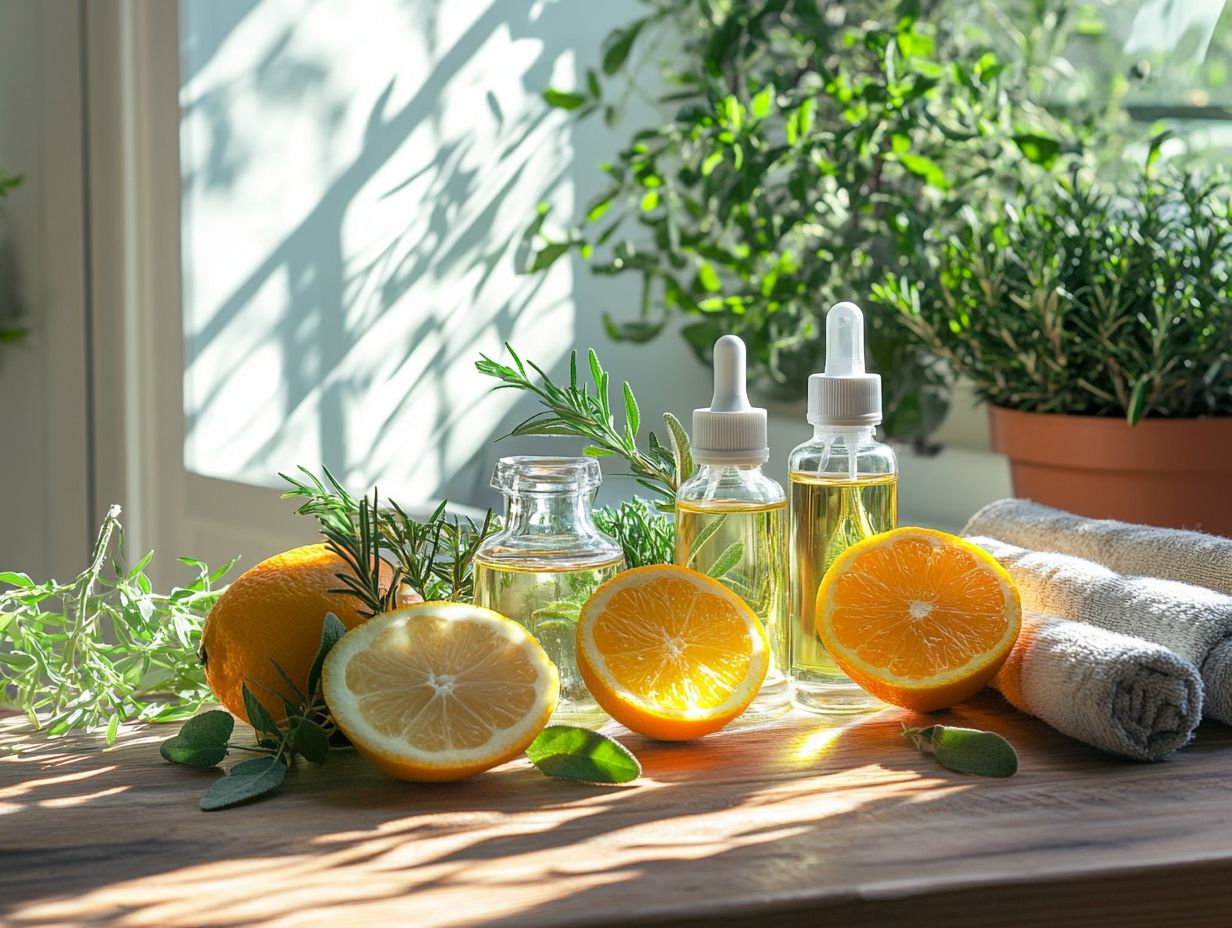
Here are some common questions about using essential oils for cleaning!
What are essential oils and how can they be used for cleaning?
Essential oils are concentrated plant extracts that have been used for their various therapeutic and aromatic properties for centuries. They can be used in cleaning as a natural alternative to harsh chemicals, as they have antimicrobial, antiseptic, and disinfectant properties.
Which essential oils are best for cleaning?
Some of the best essential oils for cleaning include lemon, tea tree, eucalyptus, lavender, and peppermint. These oils have strong cleansing and disinfectant properties, as well as a pleasant scent.
How can I use essential oils for cleaning?
There are many ways to use essential oils for cleaning, such as making your own all-purpose cleaner, adding a few drops to your laundry, or using them in a diffuser for a refreshing scent. You can also mix different oils to create a customized cleaning blend.
Are essential oils safe to use for cleaning?
Yes, essential oils can be a safe and effective option for cleaning when used properly. It is important to dilute them with a carrier oil or water and to test a small area of skin before using them on surfaces. It is also recommended to keep them out of reach of children and pets.
Can essential oils replace traditional cleaning products?
While essential oils can be a great natural alternative for cleaning, they may not have the same level of effectiveness as traditional cleaning products in certain situations. It is best to use them in combination with other cleaning methods for optimal results.
Are there any specific precautions I should take when using essential oils for cleaning?
It is important to always read and follow the instructions on essential oil labels, and to use them in well-ventilated areas. Some oils may cause skin irritation, so wearing gloves is recommended. It is also important to properly store and handle essential oils to ensure their potency and safety.

